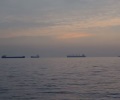

The freight space gap between Korea’s HMM, which is the eighth-largest shipper in the world, and the top seven players will widen in the next three to four years, according to the data released by a ruling party lawmaker on Oct. 19.
HMM’s deadweight tonnage stood at 840,000 TEUs as of June 2021, according to the data presented by Rep. Choi In-ho of the Democratic Party of Korea. He received the data from the Ministry of Oceans and Fisheries. The average tonnage of the world’s top seven shipping companies sat at 2.72 million TEUs. The seven are Maersk, MSC, CMA CGM, COSCO, Hapag-Lloyd, ONE, and Evergreen. The difference between HMM’s tonnage and the top seven’s average amounts to 1.88 million TEUs.
As of June 2021, the eight largest shipping companies’ new shipbuilding orders totaled 3.44 million TEUs, including 160,000 TEUs ordered by HMM. Assuming that it takes three to four years to build a ship, HMM’s tonnage will reach one million TEUs after three to four years, while the average of the top seven players expands to 3.19 million TEUs. This means the tonnage gap between HMM and the top seven will increase to 2.19 million TEUs, 16 percent wider than the current 1.88 million TEUs.
Rep. Choi noted that shipping companies need to secure super-large ships to lower transportation costs and thereby improve their competitiveness. He expressed concern that HMM might face a crisis due to the widening tonnage gap with the bigger players and a resulting drop in competitiveness.
Choi also pointed out that HMM is having difficulty ordering ships due to private banks’ weak participation in the ship finance market after Hanjin Shipping’s bankruptcy in 2016. The proportion of private banks in the Korean ship finance market plunged from 22 percent in 2014 to 7.3 percent in 2018.
“To increase private banks’ participation in the ship finance market and reduce the risk of shipping companies ordering ships, Korea should quickly introduce the tax lease system implemented in France and Japan,” Rep. Choi said. The tax lease system provides corporate tax savings to investors in the early stage of purchasing ship assets by allowing the accelerated amortization of ships.
Source: Business Korea